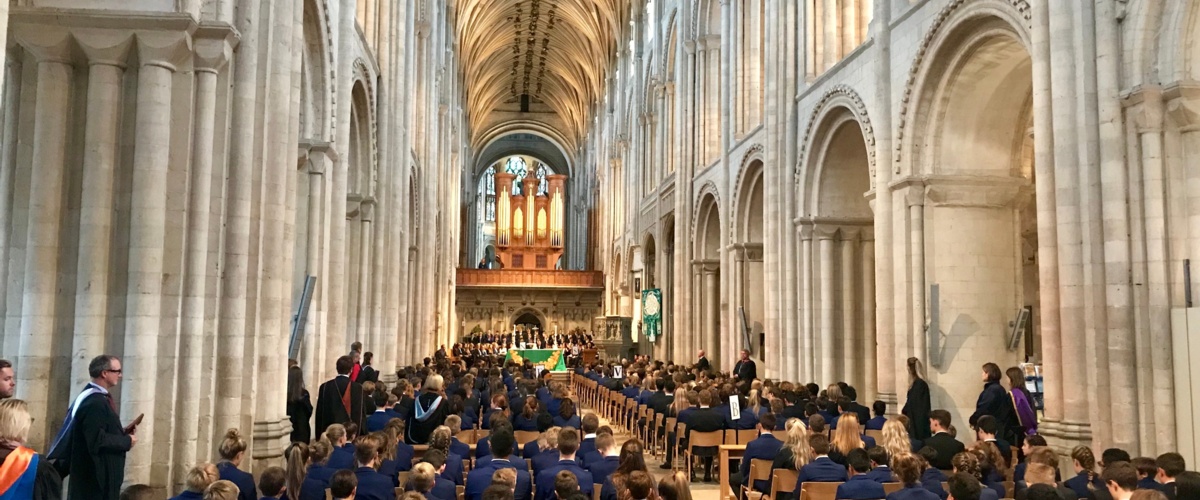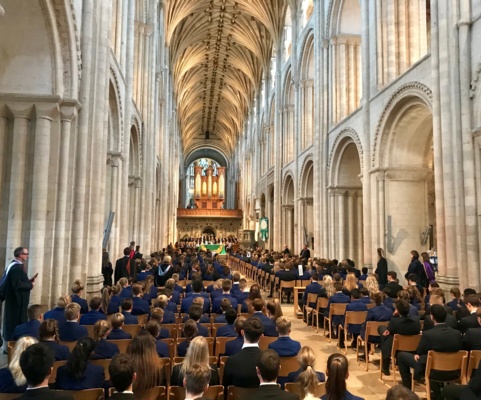Thursday 6th September 2018
Head Master's Start of Term Address
Welcome to new pupils and staff; welcome back to returning pupils and staff. Whether this is your first term or not, one cannot help but be impressed by being in this amazing building again. I trust you will enjoy being in it this year.
Today's reading offers Jesus' instruction to his disciples: that they should love each other in the way that he has loved them. It is not difficult to infer that this is something to do with being nice to each other, but in the modern world love is not an easy term. Consider the following:
- "I love Ben & Jerry's ice-cream"
- "Those three words are said too much; they're not enough" (from Snow Patrol's Chasing Cars; I'll save you all by not singing)
- "Can I help you, love?"
- "Love Island"
- (At the end of a letter) "... see you soon. Love... "
- And it is not just words. The heart emoji is ubiquitous, and there is the goal celebration used by Gareth Bale, Neymar and others. Don't worry; I won't attempt it as I am almost as bad at it as I am at Delle Alli's reverse monocle.
In many of the examples above and in modern culture more generally, love is mostly used conversationally as "really like". But what sort of love was Jesus talking about? The original Greek text from John uses the word agape. This is divine love between God and man; often described as being unconditional, sacrificial love, it is connected to the concept of charity. Yet it is not the only type of love in Greek thought; there is also:
- eros (physical, romantic love and, by the way, the closest you are going to get to Love
Island in this address);
- storge (instinctive, sympathetic affection, often felt between members of a family, hopefully even after a long summer holiday together)
- philia (non-physical friendship, sometimes referred to as brotherly or sisterly love)
I take time to expand on these different types of love because it is a word we use about ourselves a good deal at Norwich School. We talk about our community being loving and compassionate; today's reading encourages us to explore what we mean by that and it is an appropriate time to do so as our community expands in the Lower School to take in pupils from Reception for the first time. In some ways, there are elements of all four types:
in terms of agape love, our history dictates that we are a Christian foundation and our position in the Cathedral Close means that, whether you are a person of faith or not, you are encouraged to reflect on what the divine might represent for you or others;
in terms of eros (physical love), it is a na:ive school that does not recognise the physical dimension of a school community of several hundred teenagers. Our role in school is to support your navigation of these choppy waters, particularly as your physical worlds are complicated by their intersection with an ever-expanding digital existence;
in terms of storge (familial affection), the school seeks to be part of a three-cornered relationship which also involves you, the pupils, and your families. We do not seek to be your family, but for a pupil to reach his or her potential, all parts of this relationship need to be operating in harmony and we are keen to support you in your relationships at home.
But perhaps it is philia which has most in common with the love expressed in the school's ethos. It is a non-physical affection between equals which emphasises looking after each other and being helpful.
As we start this new year, it is inevitable that you will be thinking about your relationship with those around you, both at school, at home and in other friendship groups. Don't be afraid of the word love or avoid it for fear of teenage sniggers. It is a richer, deeper word than the superficial treatment implied in reality television programmes; it encompasses concepts which can underpin your success here if you allow yourself to consider them appropriately and I am keen to bring to your attention their multi-dimensionality at this goal-setting time of the year.
I am sure that you have things in your sights for the period ahead and this sense of purpose is healthy. However, do frame them in what I have been talking about so far: being a positive force in the community; having strong relationships with your family; considering your place in the wider world. It should not be the case that you are determined to be in the A team for hockey and you'll be kind to people if you can fit it in. Or you'll be monosyllabic with your parents at home, but you'll still expect them to drive you in for the next weekend rehearsal. Or you'll post that unkind message on social media about the new photo because that's not really being mean, is it?
Work from the big stuff towards your immediate goals and actions; base your day-to-day activity on long-lasting values and do so across the range of activity. I don't mean that I expect everyone to be all-singing, all-dancing, sporting renaissance giants. It is right that you will specialise in certain activities once you have tried enough out. However, I have never been more convinced of the need for your generation to be adaptable with a range of skills and never more convinced that what is special about a Norwich School education is that we care about the whole person and give a solid community platform on which you can build your own personal development. Teaching is a vocation: my colleagues and I work here because we are driven by a deep desire to help you at this important phase of your lives. There are elements of agape, philia and storge in the love that underpins that approach. It is not choosy in terms of type of activity; rather, it is based on the overall progression of young people in their time with us. So make the most of all the opportunities because of what they contribute to you and do not be afraid to do so in the name of love because there is more than one type.
I hope you all have a wonderful term.


